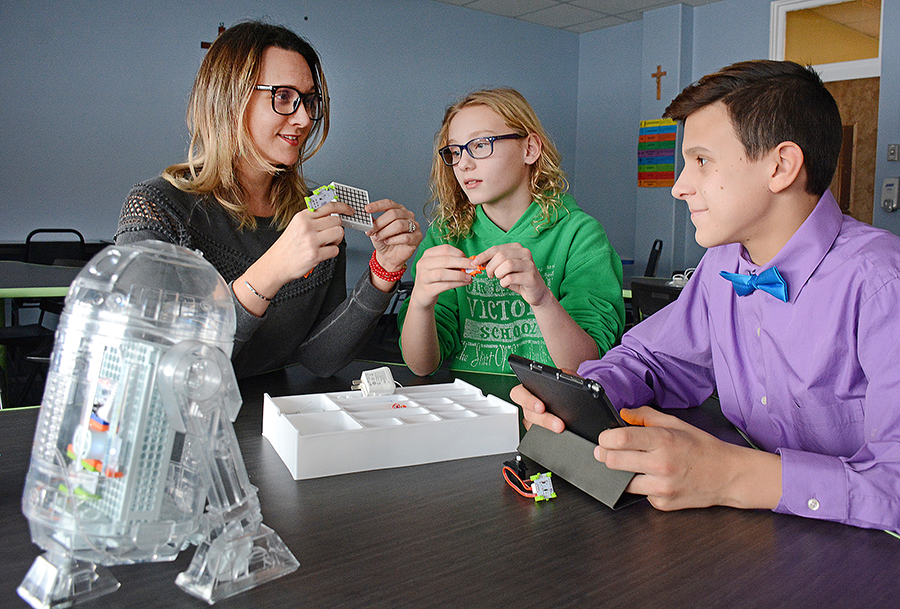Our Lady of Victory School unveils tech lab 2.0
by PATRICK J. BUECHIWed, Jan 30th 2019 10:00 am

Alongside a model of R2D2 created by OLV School students,Tech Integration Specialist Rebecca Roussev with sixth-grader Sophie Judasz and eighth-grader Matt Viverto in the school's new tech lab.
(Dan Cappellazzo/Staff photographer)
Over the next five years, more than 1,000 children are expected to learn computer and engineering skills at Our Lady of Victory Elementary School. These skills will prepare students for careers that have not even been invented yet. This is thanks to the Susan E. Brvenik Foundation.
Brvenik's foundation gave OLV a $70,000 grant to remodel the Lackawanna school's technology lab. The Nov. 8 ribbon cutting revealed laptops, iPads and a new SMARTboard. Brvenik's mother, Amelia Szymanski, was educated in this very elementary school by the Sisters of St. Joseph and she devoted more than 80 years of her life to being a member of the OLV parish.
"Our Lady of Victory National Shrine and Basilica and Elementary School have been fundamental cornerstones of my family for decades," said Brvenik. "My mother was a parishioner for more than 85 years and she was educated by the Sisters of St. Joseph at OLV Elementary. When I found out about the digital divide the students faced on a day-to-day basis and the need to update the technology lab, I was more than happy to provide financial assistance to ensure that the children attending the school would benefit from state-of-the-art technology resources that would allow them to expand their skills and further their academic careers."
The new technology lab combines two classrooms into one larger room allowing students more workspace to build and create. A new IT infrastructure was installed, along with 30 HP laptops and a new state-of-art SMARTboard. Ergonomic tables replaced the desks that all faced the front board, allowing better communication. Even the chairs have a bit of technology. They're shaped like mushrooms and allow kids to bounce up and down as a way of controlling excess energy. The room has an airplane motif with sky blue walls, and a motto of "Your wings already exist, all you have to do is fly."
"It was something that we really needed to have done. Our school was behind in technology. When I came here (in 2016), I knew it had to be first priority," said Principal Carolyn Kraus.
TheThe donation helped pay for the new furniture, computers and activities like droids and Little Bits inventor kits.
"From last year, it was definitely a big improvement. Now, we have so much more thanks to Miss Brvenik," said Matt Vivetro, an eighth-grader at the school. "We have more of an opportunity to improve. We have new laptops. We have a new board. We have iPads. We have Little Bits, which are kind of the best thing ever."
Little Bits are circuitry units that work like Legos. They can be snapped together to create space rovers, arcade games and other electronic gadgets, with units that work as microphones, USB ports and motors. Matt and his friends built a guitar.
"The Little Bits was something I really pushed because not only does it teach problem solving, it teaches teamwork, it's hands on. Creativity is used, so your using everything we promote within STREAM," said Rebecca Roussev, tech integration specialist.
Kraus credits Roussev with spearheading the project. She was hired last year to teach the students and the teachers as well.
"I rely on her to drive what she feels we need in order to give our kids the best education for 21st-century learning, 21st-century careers, and even beyond," Kraus said.
"It's not just learning how to write a paper or how to point your mouse on the right point on the computer screen," said Roussev. "It's the intricacies of everything that these kids need to know to do well, not just here but in high school and college and beyond."
Roussev has chosen some students to work as interns, maintaining and cleaning the equipment, and making sure everything is charged and properly put away. The students stay afterschool and can use that time to further explore the tools.
One student stayed late trying to figure why a Samsung tablet wasn't working on a droid he built. He finally figured it out after two and a half hours
"The joy I saw in his eyes was better than any Christmas present," said Roussev.
Drawbacks to big tech include having to update software regularly and worry about the wear on the devices.
"You want to be mindful of what devices and things that you do chose that can be adapted, reused," said Roussev.
Roussev took a poll to find out what kind of tech the kids used at home. It quickly became apparent that a "digital divide" existed. A digital divide refers to the lack of computers and internet services that millions of low-income Americans face each day. At OLV Elementary, almost 80 percent of enrolled students, fall within this divide, which hinders their ability to successfully research homework and projects.
"Our school is definitely low socio-economic backgrounds and there was a huge digital divide. Meaning that the ratio of what kids should be learning, they're probably not getting that at home because they don't have the devices. They don't even have the capabilities to even accessing the internet to look up simple questions that could help them solve," explained Kraus.
OLV Elementary introduced STREAM (science, technology, religion, engineering, the arts, and mathematics) into its curriculum in 2016, utilizing its existing computer lab for technology and engineering. They are working with ED Tech to bring more computers to the school this year.
Ed Tech is a non-profit that helps schools answer questions about any forms of technology. Helps pick the right tech. also helps secure more laptops. They get donations of old computers from large corporations. "Ed Tech has been a great support for us because of the growth of what we wanted to have," said Roussev.




